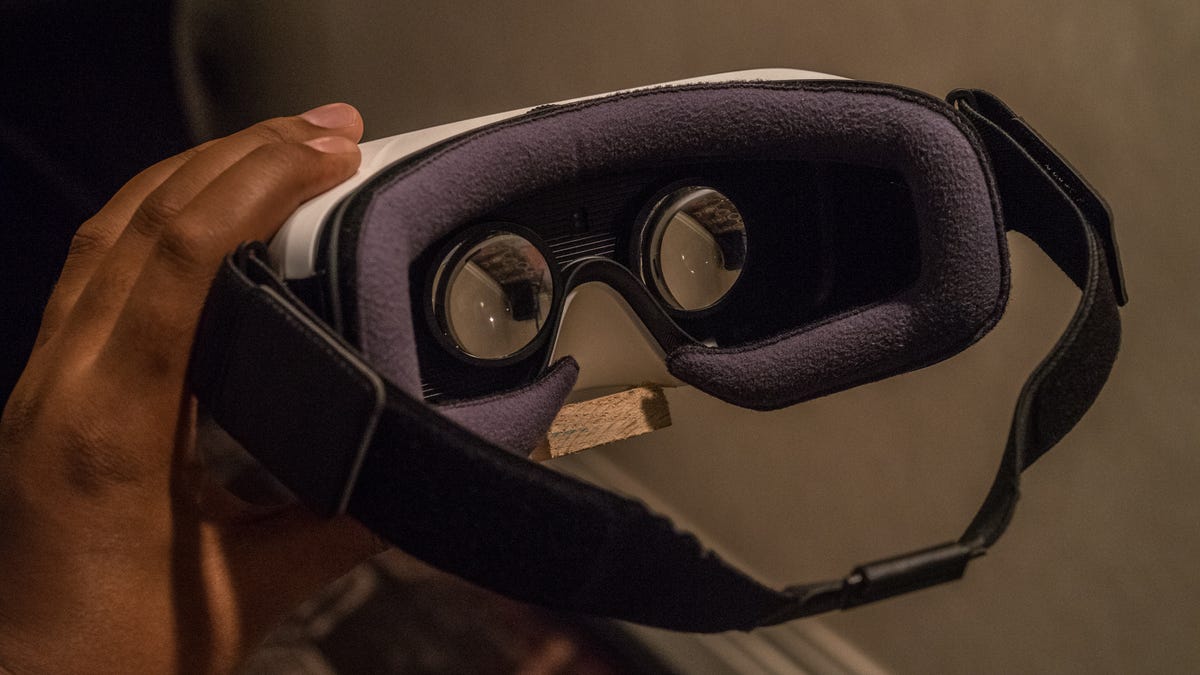Facebook, Samsung prepare to sell virtual reality to the masses
Two of the world's largest tech companies have teamed up to sell their $100 Gear VR device to everyday consumers. Will people buy it?
Facebook CEO Mark Zuckerberg is promising you a glimpse at the future of computing. It will change the way you communicate and give you a totally new way to experience video games, watch movies and see the world, he says.
The catch: You have to strap a screen to your face.
Do you do it?
That's the question consumers will face this holiday-shopping season when smartphone maker Samsung and Facebook's Oculus VR division release the first mainstream virtual-reality device in decades. The $99.99 Gear VR device, which goes on sale Friday, essentially lets you strap a Samsung smartphone to your head. A bevy of sensors, specialized software and optical lenses then give you the feeling of being transported to a computer-generated world of your choosing.
The two companies have courted some of the biggest names in the technology industry to help. Netflix, the movie-streaming service, will offer an app that lets subscribers watch films from a simulated room with a huge screen and comfy couch. A growing list of video game makers will offer titles like Deer Hunter, the space shooter Eve Gunjack and even the classic Pac-Man.
"Our theme for this has been 'bottomless content,'" said Max Cohen, head of mobile-device efforts at Oculus. He said the company has gathered more than 100 apps and games and struck partnerships with video makers to offer a variety of VR experiences. Oculus has also built an app store with programs for $1.99 to $9.99 apiece.
Convincing customers to buy the device is only half the battle, though. Most people don't even know what VR is, let alone how it works or that it's being sold broadly this year. To succeed, Samsung and Facebook need to teach customers what the technology is all about and why they should be early adopters.
The companies will try to do this by launching an ad campaign and setting up experiences at stores like electronics retailer Best Buy, where they will offer devices running short demo videos. In one of the first ads, published on Facebook, Oculus says the Gear VR will let users "watch 'The Hunger Games' in your own personal theater, play games you love, watch and immerse yourself in experiences like you're actually there."
That may be enough to convince customers to give the device a try. But to make it stick, Oculus and Samsung will need to make sure there are enough new apps, movies and other content to keep bringing people back.
"There will be a lot of experimenters and early adopters who will plop down the money to get one," said Brian Blau, an analyst at Gartner. "But after they try it the first couple of times, how are Oculus and Samsung going to convince people to try it again and again?"
Not the first rodeo
This may be the first time the VR devices are being marketed to consumers, but they've been available for purchase since last year. Samsung and Oculus sold $199 "Innovator Edition" prototypes, which worked with Samsung's highest-end phones. The final product hitting store shelves is half the price, nearly a fifth lighter and hopefully easier to use.
The device's release also marks the beginning of what will be a kickoff year for the VR industry, when HTC, Sony and Oculus release high-end devices meant to work with PCs and video game consoles.
It's a marked shift from a few years ago, when VR was still considered the stuff of Hollywood and sci-fi. Movies like "The Lawnmower Man" and "The Matrix" told of worlds created in computers that could change the course of people's lives. In the real world, though, early devices such as those from VPL Research in the 1980s and then Nintendo's Virtual Boy in the 1990s, failed to find commercial success.
The emergence of Oculus as a high-flying startup in 2012 and then Facebook's $2 billion purchase of the company last year changed much of that. The surprise purchase touched off waves of investment and interest throughout the technology industry. Meanwhile, tech giants like Sony and HTC announced their own competing VR devices. Even Google introduced its take on the technology with its ultra-low-cost Cardboard, about a million of which The New York Times sent to subscribers this month as part of a new VR-storytelling push.
Despite all that attention, Cohen, like his boss Zuckerberg, preaches low expectations for sales. The common refrain from Facebook for the past couple of months has been a reminder that new technologies rarely sell in large volumes at their launch.
"This is a new industry," Cohen said. "It's great that there's so much enthusiasm and it's great so many people are involved, but we don't expect this to be a multibillion-dollar thing overnight."
CNET's Shara Tibken contributed to this report.


